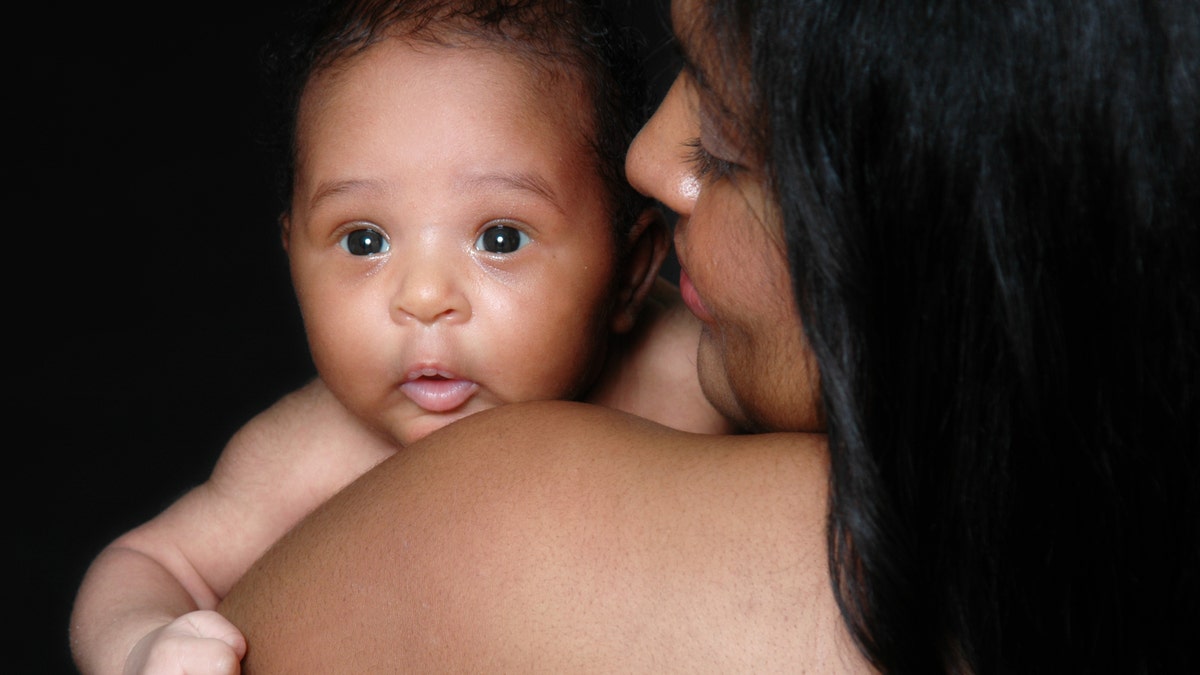
Beautiful black baby girl being held by her mother over her shoulder. (Rayna Canedy)
This past weekend the Wall Street Journal published what I consider to be the most important op-ed of the 21st century. Due to its sensitive nature, Americans rarely hear about this subject. But they should.
The article, by James Taranto, is entitled “The Politicization of Motherhood,” and it centers on an interview with psychoanalyst Erica Komisar, whose new book “Being There: Why Prioritizing Motherhood in the First Three Years Matters,” makes the oh-so-obvious yet controversial argument that babies need their mothers.
As Komisar says in a video about her book, “Mothers are critically important to children in the first three years of life. [It] impacts their emotional well-being.”
For daring to write such a book, Komisar has received the inevitable backlash. After all, it’s taboo enough to suggest parents should stay home. It’s even more taboo to suggest that parent be Mom. Why? Because popular orthodoxy insists the sexes are interchangeable. That’s what the gender equality crowd believes, and it’s what they want everyone else to believe.
If you don’t agree with it (and you shouldn’t, because it isn’t true), you’ll be treated as a pariah. “I couldn’t get on NPR,” Komisar told Taranto. And, she adds, she was “rejected wholesale—particularly in New York—by the liberal press.”
Addressing the effects of maternal absence is difficult enough on its own, but it’s impossible when, as Taranto points out, liberals—who, as we all know, dominate mainstream media—“won’t even acknowledge the problem.”
Komisar did manage to get a spot on “Good Morning America;” but prior to the interview, host Lara Spencer made it clear to Komisar that she didn’t like her book and didn’t “believe in its premise.”
Well, of course she didn’t. Morning television is dominated by female producers and journalists, many of whom are married with kids. And as Bernard Goldberg wrote in “Bias,” “…those gals got a dog in this fight.” He adds, “America’s newsrooms are filled with women who drop their kids off someplace before they go to work or leave them at home with a nanny. These journalists are not just defending working mothers—they’re defending themselves!”
How rich I’d be if I had a dollar for every time I’ve run into this media bias. My first book, which was published 15 years ago (and was coincidentally re-released this year), is similar to Komisar’s in that I make a case for why a mother’s physical and emotional presence are vital to children, to families and to society as a whole. And I too was vilified in the media.
And yet my goal, aside from supporting the work mothers at home do, is no different from Komisar’s: “We don’t want the 50s to come back. What we do want is to be a child-centric society.”
Not the kind of child-centric society we have now, where children are coddled by well-meaning but overprotective parents.
The kind that puts the needs of children above the needs of adults.
Unfortunately, Komisar and I part ways on how to create such a society. As a political liberal, Komisar believes the answer is other people’s money. “All mothers and babies should have the right to be together in the first year,” she says. To do that, America needs maternity leave at full pay “and then flexibility to be together as much as possible for the next two years—meaning mothers should have the ability to work flexibly and part time.”
It is true that flexibility and part-time work become indispensable once children are older and in school all day, but it’s pointless in the first three years. The needs and demands of a baby, let alone a baby and a toddler, are simply too great to be able devote one’s attention to something else without everything falling apart.
Still, there is much Komisar gets right. Her case is particularly compelling because her work has been developed from “three decades’ experience treating families,” writes Taranto. And her conclusions are right on the mark—though admittedly, for some, are hard to hear.
“What I was seeing,” notes Komisar, “was an increase in children being diagnosed with ADHD and an increase in aggression in children, especially in boys, and an increase in depression in little girls.” She saw that the absence of mothers in children’s daily lives was “one of the triggers for these mental disorders.”
Addressing the effects of maternal absence is difficult enough on its own, but it’s impossible when, as Taranto points out, liberals—who, as we all know, dominate mainstream media—“won’t even acknowledge the problem.”
They won’t acknowledge it because they refuse to allow themselves, or anyone else, to feel guilty about the choices they’ve made—as if experiencing this emotion is tantamount to being tortured.
But it isn’t the end of the world to feel guilt. “My best patient is a patient who comes to me feeling guilty,” says Komisar. “Women who feel guilty—it’s a ‘signal’ feeling, that something’s wrong, that they’re in conflict. If they go talk to a therapist or deal with the conflict head-on, they often make different choices and better choices.”
And one of those choices, to prioritize baby care well in advance of its arrival, is a smart one. The only reason women don’t do this today is because we place so little value on motherhood. We don’t understand the significance of what goes on the early years and how indispensable mothers are to their babies. We don’t understand it because we refuse to look.
But the information is there for all who choose to see.








































